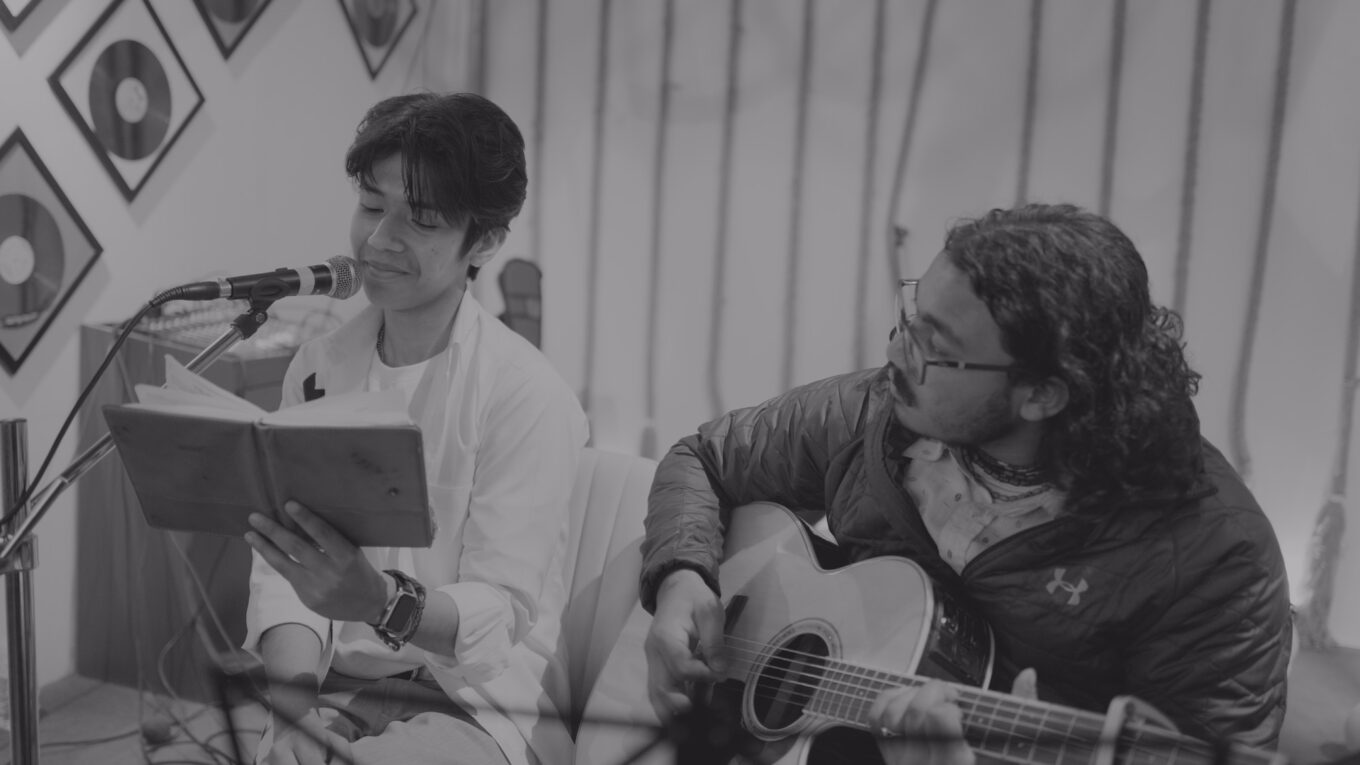Hoffnung in Versen – Ein Lyrikabend im Aufbruch
Noch ganz erfüllt vom gestrigen Neujahrsfest in Kathmandu, dessen rhythmischer Puls zwischen Tradition und urbaner Vitalität schlug, trug mich der Abend in eine ganz andere, stillere Sphäre – in die Worte junger Dichterinnen und Dichter. Nach den letzten Besuchen zweier beeindruckender Ausstellungen war es nun die Poesie, die mich erneut überraschte, berührte, zum Staunen brachte.
Zufällig – oder wie es manchmal scheint: genau zur rechten Zeit – stieß ich in den sozialen Medien auf eine kleine, bemerkenswerte Gruppe junger nepalesischer Autor:innen. Angeführt wird sie von Kayera, einer Dalit, die mit ihren Gedichten und Geschichten über Diskriminierung, Stärke und Selbstbehauptung leise, aber unüberhörbar eine neue Perspektive in die Literaturszene bringt.
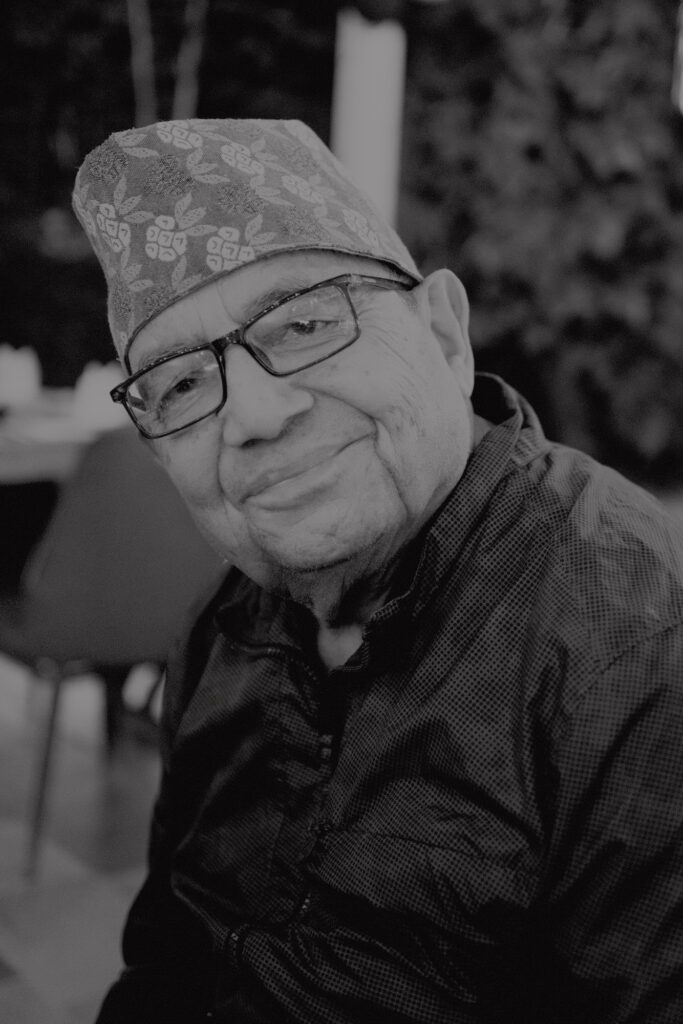
Am Neujahrsabend traten sie auf – in einem Ort, den ich nicht erwartet hätte: The Society – Fine Dining Redefined. Uns unbekannt bis dahin, aber atmosphärisch durchgestaltet bis ins Detail. Wir hatten am Morgen zum Glück reserviert, saßen nun draußen im angenehmen Abendlicht, bestellten chicken chilli und nachos, und erstmals seit meiner Ankunft in Kathmandu bestellte ich ein Glas Rotwein. Es gab genau eine Sorte – einen Sauvignon aus Chile. Egal. Auch Hishsi, die sonst keinen Schluck Alkohol anrührt, nippte. In ihrem Umfeld haben zu viele Männer durch Alkohol Beziehungen, Familien, Lebenspläne zerstört.
Neben uns setzte sich ein älterer Herr, Baranas unter dem Arm – ein Roman über die mythische Stadt Varanasi, die ich vor meiner Rückreise gern noch besuchen möchte. Sein Gesicht gezeichnet vom Leben, das er größtenteils in den USA verbrachte, als Ingenieur bei Texas Instruments. Jetzt schreibt er – auf Nepalesisch – über nepalesische Männer, die sich in Frauen aus anderen Kulturen verlieben. Orte und Begegnungen. Leben und Fiktion.
Später nahm er bei uns Platz: Arun Sharma. Einer der feinfühligsten nepalesischen Erzähler unserer Zeit. Seine Werke – Aparichita, Sushi’s Diary, Michigan Blues – balancieren zwischen psychologischer Tiefe und soziokultureller Analyse. Auch er trank ein Glas Wein. Es war ein Abend der Übergänge.
Dann begannen die Lesungen.
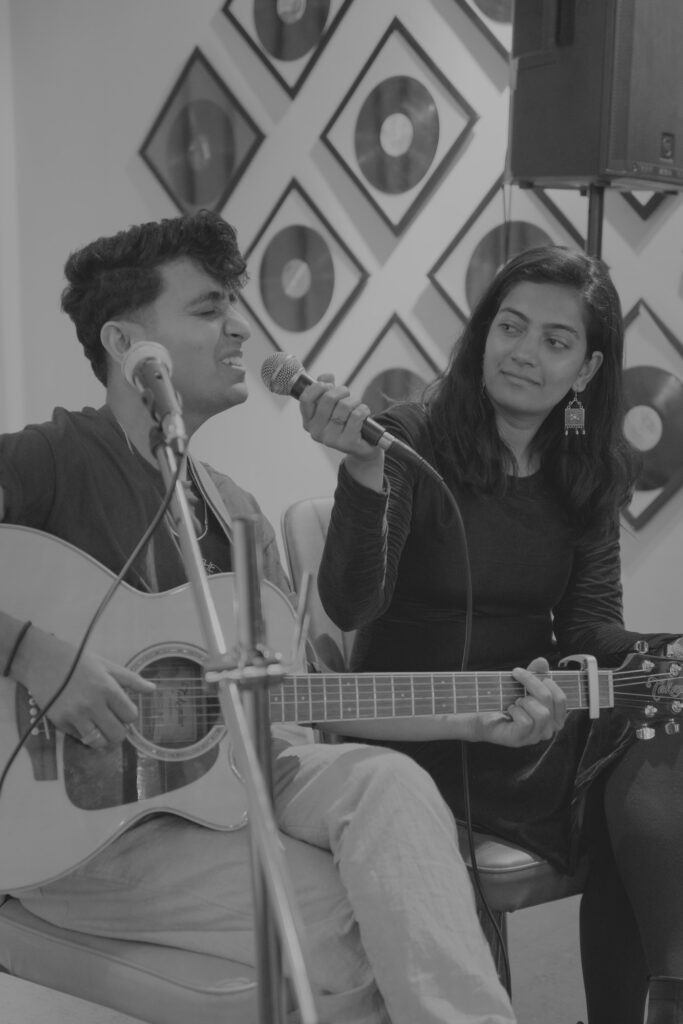
Kayera, begleitet von Nigam an der Gitarre, eröffnete den Abend. Alles auf Nepalesisch – ihre Stimme trug Bilder und Schmerz, Zärtlichkeit und Wut. Dann kamen Pyush und Nabin. Piyush fesselte mich. Nicht nur lyrisch, auch visuell: Er malt, er fotografiert – und erinnert an jene Typen, die in Deutschland oft in Waldorfschulen zu finden sind: hochkreativ, sozial sensibel, eigenwillig und frei. Subekshya, die Letzte, trug als Einzige zwei Gedichte auf Englisch vor – eines davon, “Time That Changed Everything”, brachte mit fast schmerzhafter Präzision eine stille Trennung auf den Punkt.
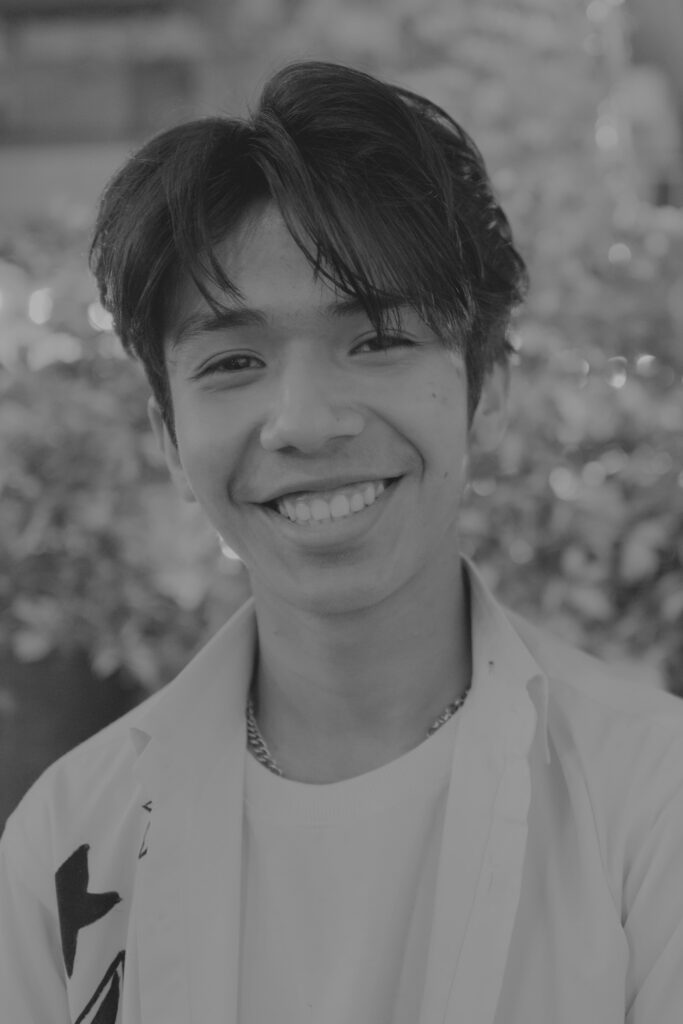
Auch Pyush’ Gedicht – „Das Ende des Endes“ – wirkt nach. Eine Meditation über Abschied, Erinnerung und leise Hoffnung. Ich habe es inzwischen mehrfach gelesen, wie man ein Stück Musik wieder und wieder hört, weil es etwas sagt, was man selbst noch nicht sagen kann.
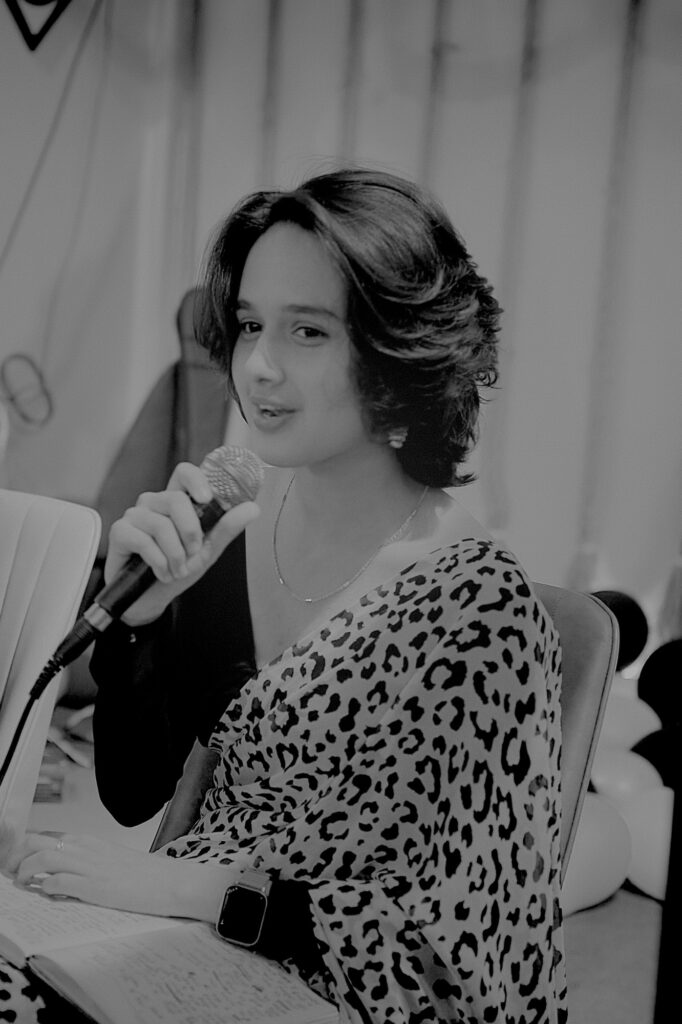
Und dann: Hoffnung.
Angesichts der vielen Gespräche, die ich hier über Auswanderung, über das Verlassen des Landes, über Chancen und Frustrationen junger Nepales:innen führe, war dieser Abend wie ein Gegenbild. Eine andere Bewegung. Hier entstehen keine Fluchtpläne, sondern ein Raum – ein Möglichkeitsraum für Kunst.
Denn: Kunst braucht Boden. Sie braucht Schutz, Sicherheit, ein Maß an materieller Stabilität. Diese jungen Stimmen – kraftvoll, sensibel, wach – stehen am Anfang. Sie vernetzen sich, treten auf, schreiben, komponieren, performen. Nicht in großen Theatern, sondern in Innenhöfen und Cafés, in Restaurants wie The Society, das an diesem Abend tatsächlich gesellschaftlich wurde.
Vielleicht sind es diese kleinen Zirkel, in denen eine neue kulturelle Selbstverständlichkeit wächst. Eine Kunst, die nicht zuerst exotisch oder touristisch sein will, sondern persönlich, politisch, poetisch. Sie bleibt nicht im Privaten, sondern öffnet sich dem gemeinsamen Raum.
Ich ging mit dem Gefühl, etwas Echtem begegnet zu sein. Und mit einer Hoffnung, die mehr ist als ein vages Gefühl: Dass hier eine Generation heranwächst, die nicht nur das Land verlassen will – sondern eines, die beginnt, es neu zu erzählen.
In Versen. In Bildern. In Klängen.
Und vielleicht – in einer Zukunft, die bleibt.
English version below
Hope in verse – a poetry evening on the move
Still full of yesterday’s New Year celebrations in Kathmandu, whose rhythmic pulse beat between tradition and urban vitality, the evening carried me into a completely different, quieter sphere – into the words of young poets. After my last visits to two impressive exhibitions – by a South Korean conceptual artist and a group show from Bhaktapur – it was the poetry that surprised, touched and amazed me once again.
By chance – or, as it sometimes seems, at just the right time – I came across a small, remarkable group of young Nepalese writers on social media. They are led by Kayera, a Dalit who quietly but unmistakably brings a new perspective to the literary scene with her poems and stories about discrimination, strength and self-assertion.
On New Year’s Eve, they performed at a venue I hadn’t expected: The Society – Fine Dining Redefined. Unknown to us until then, but atmospherically designed down to the last detail. Fortunately, we had made a reservation in the morning and were now sitting outside in the pleasant evening light, ordering chicken chilli and nachos, and for the first time since my arrival in Kathmandu, I ordered a glass of red wine. There was exactly one type – a Sauvignon from Chile. No matter. Even Hishsi, who normally doesn’t touch a sip of alcohol, sipped. Too many men around her have destroyed relationships, families and life plans through alcohol.
An elderly gentleman sat down next to us, Baranas under his arm – a novel about the mythical city of Varanasi, which I would like to visit before my return journey. His face was marked by a life spent mostly in the USA, as an engineer at Texas Instruments. Now he writes – in Nepalese – about Nepalese men who fall in love with women from other cultures. Places and encounters. Life and fiction.
Later he took a seat with us: Arun Sharma. One of the most sensitive Nepalese storytellers of our time. His works – Aparichita, Sushi’s Diary, Michigan Blues – strike a balance between psychological depth and socio-cultural analysis. He also had a glass of wine. It was an evening of transitions.
Then the readings began.
Kayera, accompanied by Nigam on the guitar, opened the evening. Everything was in Nepalese – her voice carried images and pain, tenderness and anger. Then came Piyush and Nabin. Piyush captivated me. Not only lyrically, but also visually: he paints, he photographs – and reminds me of the types of people who can often be found in Waldorf schools in Germany: highly creative, socially sensitive, headstrong and free. Subekshya, the last one, was the only one to recite two poems in English – one of them, „Time That Changed Everything“, summarised a silent separation with almost painful precision.
Pyush’s poem – „The End of the End“ – also had a lasting effect. A meditation on farewell, memory and quiet hope. I have now read it several times, like listening to a piece of music over and over again because it says something that you cannot yet say yourself.
And then: hope.
In view of the many conversations I have here about emigration, about leaving the country, about the opportunities and frustrations of young Nepalese, this evening was like a counter-image. A different movement. No escape plans are created here, but a space – a space of possibility for art.
Because: art needs ground. It needs protection, security, a degree of material stability. These young voices – powerful, sensitive, awake – are at the beginning. They are networking, performing, writing, composing, performing. Not in large theatres, but in courtyards and cafés, in restaurants like The Society, which actually became social on this evening.
Perhaps it is in these small circles that a new cultural self-evidence is growing. An art that doesn’t want to be exotic or touristy first, but personal, political, poetic. It does not remain in the private sphere, but opens up to the common space.
I left with the feeling that I had encountered something real. And with a hope that is more than a vague feeling: that a generation is growing up here that not only wants to leave the country – but one that is beginning to tell it anew.
In verse. In pictures. In sounds.
And perhaps – in a future that remains.
